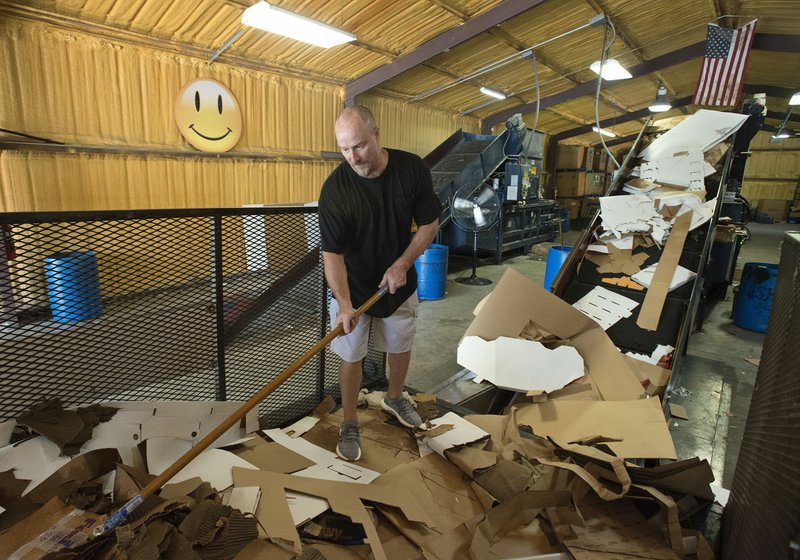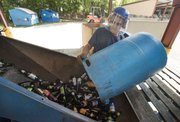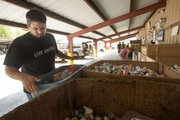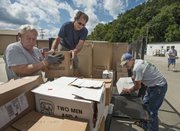Northwest Arkansas throws away thousands of tons of recyclable materials a year by putting so many bottles, cans and cardboard boxes in trash cans instead of recycling bins, local officials say.
If those materials were recycled, the extra tons could be enough to justify and sustain a long-discussed, multimillion-dollar regional recycling facility, based on estimates given to Fayetteville earlier this year as the city worked on a plan for sending less to the region's Eco-Vista landfill west of Springdale.
Northwest Arkansas recycling
The region recycles at least 20,000 tons a year of plastics, paper, metal cans, cardboard and glass, based on annual data or estimates ranging from 2015 to now. For the sake of comparison and to put together a total amount of material that would likely go to a regional recycling facility, these numbers don’t include yard waste or materials like fabrics or household hazardous waste that are collected by some groups.
Location*Amount in tons (to the nearest 100)
Bella Vista*2,600
Benton County Solid Waste District*900
Bentonville*1,800
Boston Mountain Solid Waste District (Washington and Madison counties)*1,000
Fayetteville*6,100
Rogers*1,700 (Includes only drop-off center)
Springdale, Farmington, Centerton and Cave Springs (Service provided by Waste Management, which gave an aggregate number)*4,500
Siloam Springs*1,200
University of Arkansas, Fayetteville*400
Total*20,200
Source: Staff report
Acceptable recyclables
The materials you can recycle often depend on where you are and where you take them. Make sure materials are rinsed out or clean of food, which can cause the material to be thrown away or make recycling more difficult. Some groups might also take materials not listed here; check with them for drop-off locations.
LocationType of serviceAccepted materials*Contact
Bella VistaDrop-off centers, some commercial pickup serviceGlass, #1 and #2 plastics, paper, cardboard, aluminum cans, fabrics*479-876-5343
Benton County Solid Waste DistrictDrop-offGlass, #1 and #2 plastics, paper, cardboard, aluminum and steel cans*5702 Brookside Road in Bentonville, 479-795-0751, http://bentoncounty…">bentoncountyrecycle…
BentonvilleResidential curbside and drop-offPlastics #1-7, paper and books, cardboard, aluminum cans*479-271-3100, http://bentonvillea…">bentonvillear.com
Boston Mountain Solid Waste District (Washington and Madison counties)Drop-offGlass, #1 and #2 plastics, paper and books, cardboard, aluminum and steel cans, fabrics, shoes, motor oil, batteries*479-846-3005, http://bostonmounta…">bostonmountain.org
FayettevilleResidential curbside and drop-offGlass, #1 and #2 plastics, paper, cardboard, aluminum and steel cans*http://fayetteville…">fayetteville-ar.gov
RogersResidential curbside and drop-offGlass (drop-off location only), #1 and #2 plastics, paper, cardboard, aluminum and tin cans, Styrofoam (drop-off location only)*479-878-1384, http://rogersar.gov">rogersar.gov
Siloam SpringsResidential curbside and drop-offGlass (drop-off location only), #1 and #2 plastics, paper, cardboard, aluminum and tin cans*479-524-5136, http://siloamspring…">siloamsprings.com
SpringdaleResidential curbside and drop-offGlass, #1 and #2 plastics, paper, cardboard, aluminum, tin and steel cans*479-878-1384, http://springdalear…">springdalear.gov
Source: Staff report
Waste district leaders and other experts said such a facility could allow the region to boost recycling even further by unifying a fractured recycling market and making it possible to recycle more challenging materials, such as the plastic used in yogurt cups. In fact, the region would need that kind of facility and more people and more trucks devoted to the job to handle any increase in recycling, several officials said.
"They're handling about all they can handle right now," said George Wheatley, public affairs for Waste Management in Arkansas, which hauls recyclables for Springdale, Centerton and other cities, and owns the Rogers facility where much of it goes as well as the landfill.
Tallying the recycling
Benton and Washington counties, their cities and the University of Arkansas, Fayetteville, recycle at least 20,000 tons of plastics, paper, metal cans, cardboard and glass a year, according to data from the Arkansas Department of Environmental Quality and estimates from several cities or their haulers for primarily residential collections in 2015 or last year.
Fayetteville and Siloam Springs collect and sell residential recyclables on their own while Bentonville, Rogers and Springdale each contract with commercial waste haulers.
The yearly figure doesn't include yard waste that's composted or items such as electronics that aren't always accepted by different recyclers. It's also incomplete. Inland Waste Solutions, the company providing waste and recycling pickups in Rogers, didn't respond to several calls asking for comment in the last two weeks. Rogers' city-managed drop-off center, for its part, took in about 1,700 tons last year.
Fayetteville recycles the most among the area's biggest cities, according to recycling numbers provided, turning in more than 6,000 tons a year. But Bella Vista stands out in terms of amount per resident.
A curbside recycling program recently ended there because so few homes took part, Mayor Peter Christie said, leaving only the independent, nonprofit drop-off center in the city just off Interstate 49. The place takes in roughly 2,500 tons a year, most of it cardboard volunteers pick up from restaurants and other nearby businesses.
That comes to around 170 pounds per Bella Vista resident, compared to about 150 pounds for Fayetteville and 80 for Bentonville.
The center pays a few staff members from what it earns selling the material to companies that use it to make new products. It gives around $100,000 that's left over a year to area charities, said Paul Poulides, a member of the center's board. The center's volunteers earn $6 per hour for the charities of their choice.
"People, they want to give," he said earlier this month as a trailer load of cardboard arrived at the center. "Everybody gains."
Despite the center's strong showing, Poulides estimated only one in six Bella Vista homes is participating, bringing in about 40 percent of the center's materials -- the rest is commercial. Those numbers would mean Bella Vista residents are throwing away more than 5,000 tons of recyclables, enough to triple the center's output.
Fayetteville residents, likewise, threw away more than 10,000 tons of materials in 2015 that could be accepted by its recycling program, according to a report released earlier this year from Florida-based Kessler Consulting. The city brought on the group to analyze its waste patterns and explore ways to divert more of it from the landfill.
Other cities don't have such detailed numbers, but Don Tennison, sanitation superintendent in Siloam Springs, said he expects his city's waste stream would be similar to Fayetteville's. That would be another 5,000 tons or so of recyclables. Similar calculations for Bentonville, Springdale and other cities would mean thousands more.
Put it all together, and the region could double its recycling to more than 40,000 tons every year if its residents and cities sorted the material properly.
The more than 20,000 recyclable tons tossed in the landfill equal all of Bella Vista and Bentonville's garbage, according to Republic Services, which provides their collections.
Those tons cost more than $700,000 to landfill, based on Waste Management's landfilling charge of $40 or so per ton. Meanwhile, cities could earn or save more than $2 million annually by selling that material and by not paying to throw it away, based on Fayetteville and Siloam Springs' revenue and savings per ton.
Regional possibilities
Reaching that potential 40,000 recycled tons or more could be enough to make a new materials recovery facility that would sort and process recycling for all of Northwest Arkansas worthwhile, several officials said.
Wheatley with Waste Management said he'd expect such a facility would cost $10 million or more and would need at least 3,000 tons of input per month to earn back the investment. The 40,000-ton figure would just surpass that minimum.
"Northwest Arkansas truly needs to have a single facility to process all of the recycling that goes on here," Wheatley recalled telling Kessler during their study. "But, I said, that takes a lot of getting along."
Marck Recycling, which manages Waste Management's Rogers facility and handles the recyclables coming from Springdale, Rogers and other cities, declined to give any comment.
Wheatley and others agreed the facility would require multiple cities and haulers to cover the cost together. The Kessler study raised the option of Fayetteville's building its own smaller facility for around $4 million, but the City Council didn't include it in its 10-year recycling plan approved in February.
Others are trying to see if a regional facility could work. Boston Mountain Solid Waste District, the public organization that licenses trash collectors and accepts recyclables in Madison and Washington counties, hopes to use a $100,000 grant from the Arkansas Department of Environmental Quality for a 10-year waste-reduction study that might look into where a regional facility could stand, for example, director Robyn Reed said.
Wendy Bland, Reed's counterpart for the Benton County Solid Waste District, said the Closed Loop Fund could also help. The fund, founded three years ago with investments from the Walmart Foundation, Unilever and other large companies, gives low-cost loans to cities or groups building recycling infrastructure.
"This is like the airport, which needed multiple cities to be supportive," said Rob Smith, communications and policy director for the nonprofit Northwest Arkansas Council, referring to Northwest Arkansas Regional Airport west of Bentonville.
The council, the Northwest Arkansas Regional Planning Commission, the waste districts and others for the past year or two have been discussing the possibility of a regional facility, though the discussion is very preliminary, Smith said. The group saw President Donald Trump's promise for hundreds of billions of dollars for infrastructure projects as a potential opportunity, Smith and Bland said, though nothing has come of that promise yet.
Bland said she doesn't think Northwest Arkansas recycles enough for the facility but should have enough if Fort Smith or Joplin, Mo., joined in the effort. The facility could then allow a surge in recycling here, she said.
Individual cities often don't have enough of some plastics and other materials need a certain volume to be worth the effort, so none of those materials gets recycled in the area's fractured system. A central recycling program would allow cities to combine their materials and change that, for example.
A regional facility also would allow a consistent recycling program, so no one's wondering whether their recycling program takes glass or some other substance. The straightforward education and public outreach under this system "would just be awesome," Reed said.
In Fayetteville, talk about a recovery facility has mainly centered on the idea of using single-stream recycling, where all recyclable materials can be put in the same bin and are sorted at the facility, rather than the curb-sorting used now. Several residents oppose single-stream because it often means higher contamination rates in the material, preventing some from being recycled. The city decided against single-stream for now.
Mayor Lioneld Jordan said he'd nonetheless be interested in a discussion about a regional center. Tennison in Siloam Springs, which has the same curb-sort system and concerns about contamination as Fayetteville, said he also would be interested in the facility if it's well-run and keeps the material clean.
"Right when we figure out what we're doing as a region, the city of Siloam Springs will jump onto that, as long as it's a responsible program," Tennison said.
Growth and change
In the meantime, several cities and groups are bringing in more recycling and working on growing it further. Siloam Springs a few years ago switched to taking a set, limited amount of trash per pickup rather than accepting everything residents set out on the curb, Tennison said. The system thus gave an incentive to throw away less, and the city saw recycling jump by a third.
Fayetteville's council voted this year to begin accepting recycling from some apartment complexes, food waste for composting and construction debris for recycling. The food program should begin this month at the University of Arkansas campus and three public schools, said Brian Pugh, the city's waste reduction coordinator. The city will likely put out bids for the apartment and construction programs next year.
"We won't be able to collect them until we get additional recycling trucks and people, because we're maxed out on our collections right now," Pugh said, echoing Tennison and Wheatley. He said those requests will come up in the city's capital improvement budgeting process.
The city also will expand its efforts to inform people about its program and ways to throw away less to begin with, such as by bringing their own bags to grocery shop or containers for restaurant leftovers, Pugh said.
In Bella Vista, Poulides said there are plenty of businesses the recycling center hasn't approached yet for its cardboard program, and it continues its outreach through churches and media. But he'd have to hire more people if the center sees any substantial jump in material as well.
"We got a long ways to go," he said.
NW News on 08/27/2017




